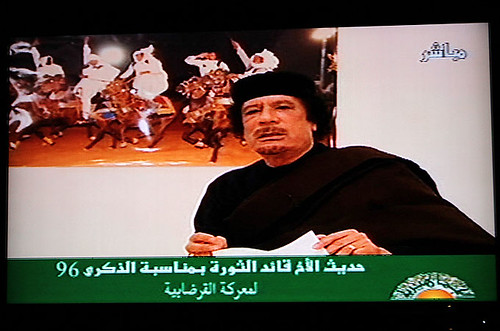
Poster Libyan revolutionary leader Muammar Gaddafi speaking on television in the North African oil-rich state. Libya has fought off an imperialist onslaught for the last eight months., a photo by Pan-African News Wire File Photos on Flickr.
Gadhafi urges resistance to Libya's new leaders
By HADEEL AL-SHALCHI
Associated Press
TRIPOLI, Libya (AP) — Moammar Gadhafi called on Libyans to take to the streets and wage a campaign of civil disobedience against the country's new leaders Thursday — the first word from the fugitive leader in just over two weeks.
Gadhafi said the National Transitional Council, which has assumed leadership of the country since then-rebel forces swept into Tripoli in late August, has no legitimacy because it was not nominated or appointed by the Libyan people.
He called on his countrymen to "go out in new million-man marches in all cities and villages and oases."
"Be courageous, rise up, go out in the streets," he said. "Raise the green flag in the skies ... the conditions in Libya are unbearable."
Gadhafi made the appeal in an poor quality audio recording and it was not possible to verify his identity, but it was broadcast on Syrian-based Al-Rai TV, which has become the mouthpiece of his resistance.
Counter-revolutionary forces, aided by NATO airstrikes, have gained control over sections of the North African nation and forced the leader and two of his sons into hiding.
Gadhafi has made several speeches on Al-Rai as he tries to rally supporters, who are still waging fierce resistance in his besieged hometown of Sirte, the town of Bani Walid southeast of Tripoli and pockets in the south.
He was last heard on Sept. 20 calling the revolution a "charade gaining its legitimacy through airstrikes."
The International Red Cross, meanwhile, delivered medical supplies and other humanitarian aid to civilians in Sirte amid rapidly deteriorating conditions.
Dibeh Fakhr, a spokeswoman for the International Committee of the Red Cross, said two trucks entered Sirte and distributed the goods, which included baby milk, hygiene kits, diapers and clean drinking water.
It was the ICRC's third successful foray into the Mediterranean coastal city since Saturday, but the first time aid workers reached the main hospital.
Sirte, 250 miles (400 kilometers) southeast of Tripoli, is the most important of the pro-Gadhafi cities that are still holding out against Libya's new rulers, and its defenders have put up a fierce resistance, with the two sides trading artillery, tank and mortar shelling.
Hundreds of families have been streaming out of the city to escape the violence. Thousands have set up camp outside if Sirte, raising concerns about a possible humanitarian crisis. Counter-revolutionary forces say they have delayed a full assault to give willing civilians time to flee.
"Sirte is becoming a ghost town," said resident Salim Omar as he passed a checkpoint manned by revolutionary forces on the city's western outskirts.
The Red Cross reached the Ibn Sina hospital Thursday morning after receiving assurances from both sides that they would be given safe passage. They evacuated three people suffering from serious injuries, including a 9-year-old girl.
Patients were being treated in the hospital corridors because the wards were exposed to heavy shelling and gunfire, Fakhr said. She added that there was no electricity or running water, and few medical staff.
"Only three doctors are remaining inside — one anesthetist, one surgeon and one orthopedist — and some medical students are trying to help the situation," she said.
She called on both sides to spare the hospital and the many wounded civilians inside.
Fakhr did not have an estimate for the number of civilians left inside Sirte. She said most people fleeing the city were leaving toward the east. Some 18,000 people living in camps in that area had received aid this week from the ICRC, she said.
NATO ministers meeting in Brussels on Thursday said the bombing campaign in Libya will continue until armed resistance to the new pro-Western regime ceases.
In Tripoli, a crowd of about 30 people picketed outside a hotel to protest an exiled Libyan Jewish man's attempt to restore the capital's main synagogue.
David Gerbi, who fled to Italy with his family in 1967 as anger rose over the Arab-Israeli war, broke into the crumbling building over the weekend, but Libyan authorities quickly closed it again, saying the effort was premature. Gerbi has said he won't give up.
Abdul-Razzaq Grisa, a 28-year-old Islamic religious student, said the main condition for Jews to return to Libya was to give all Palestinians their rights and houses back and return them to their homeland.
"If they can do that and we can see that one day maybe we will reconsider the option their existence in our country," he said, adding he didn't expect that to happen.
Al-Shalchi reported from Sirte. Associated Press writer Sarah El Deeb contributed to this report from Cairo.
No comments:
Post a Comment